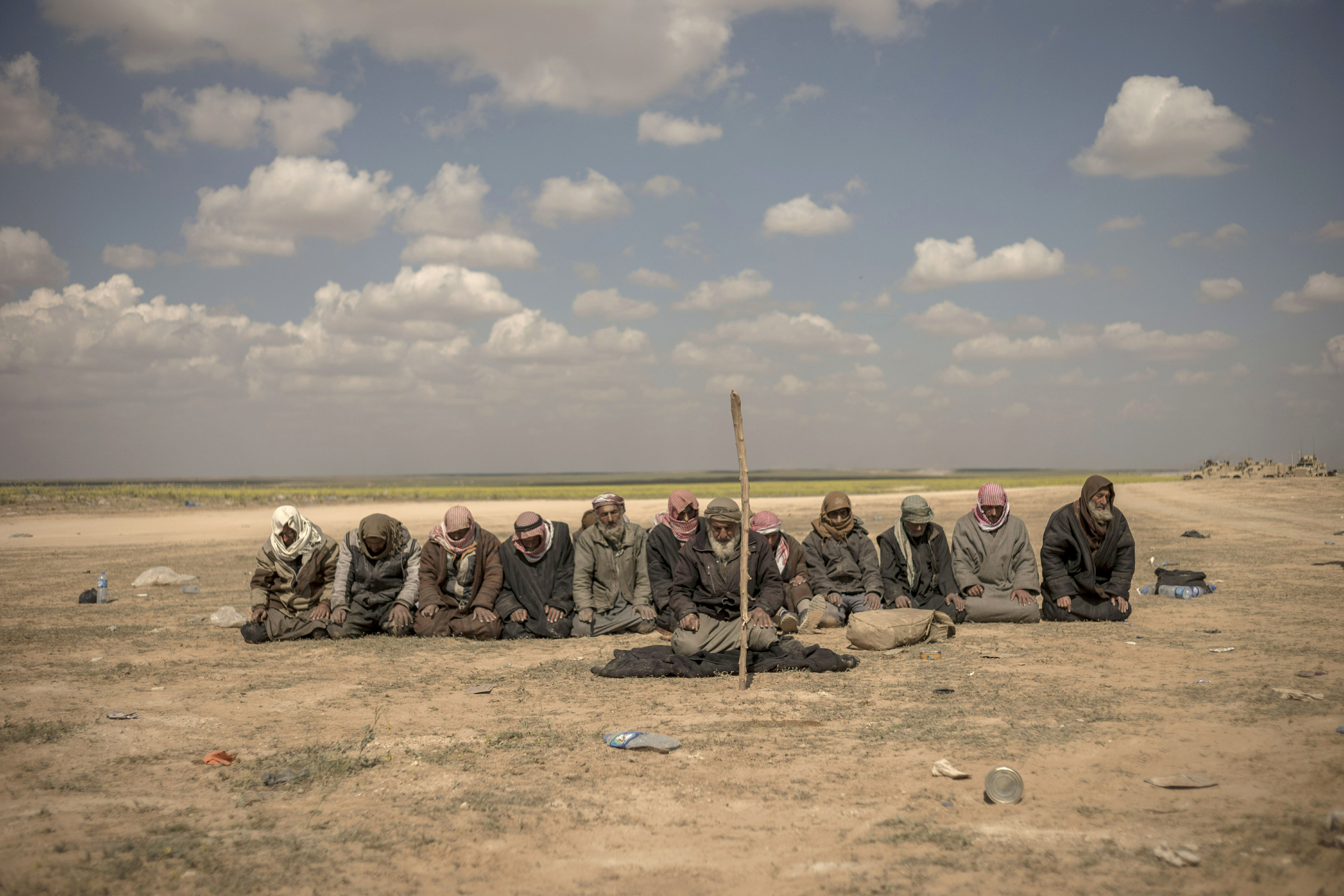
More suspected IS members leave extremists' holdout in Syria
OUTSIDE BAGHOUZ, Syria (AP) — Suspected Islamic State group members, including foreign fighters, sat in a long line in a field of bright yellow flowers, exhausted and hunched over as they were questioned and searched Thursday by U.S.-led coalition members and Kurdish fighters. They were the latest group to surrender from the besieged final pocket of Syrian territory held by the militant group.
Unlike previous days when hundreds of families emerged from the IS-held Baghouz village, the evacuees included dozens of fighting-age men, some of them wounded and limping on crutches days after U.S.-backed forces pounded the area.
Armed coalition fighters encircled the line of men, whose heads were bowed to the ground, to screen them. Separately, Kurdish fighters of the Syria Democratic Forces searched them for weapons and information.
The men were separated into three groups — Syrians, Iraqis and other nationalities. The SDF has besieged Baghouz since September, but the fight has been slowed because of the enormous number of civilians who have surfaced in the tiny shred of territory on the banks of the Euphrates River in eastern Syria — well over 10,000 have filtered out over the past two weeks.
The surrender of dozens of men Thursday could be a sign that the IS fighters inside are starting to wear down. But it is not known how many militants remain and SDF officials say they expect there are still hundreds inside vowing to fight. The territorial defeat of IS, which once presided over a self-proclaimed Islamic caliphate that straddled huge areas of Iraq and Syria, would be a milestone in the devastating four-year global campaign to crush the group.
But IS militants have scattered in the vast desert between the two countries and sleeper cells continue to stage guerrilla-style attacks. The top U.S. commander for the Mideast said Thursday that unless the group and its ideology are handled properly, IS will sow the seeds of future violent extremism.
“What we are seeing now is not the surrender of (IS) as an organization but a calculated decision to preserve the safety of their families and preservation of their capabilities,” said Gen. Joseph Votel, adding that the insurgents are going underground in remote areas, “waiting for the right time to resurge.”
Votel’s assessment provides a reality check to President Donald Trump’s repeated assertion in recent weeks that IS has been defeated and lost 100 percent of its “caliphate,” which once covered a vast territory straddling Syria and Iraq. Votel said the fight against IS and violent extremism is far from over.
On Wednesday night, seven Yazidis including two women, arrived at the SDF-controlled side. One of them identified herself as Israa, 20, and said she was sold as a sex slave to 10 different men.
Many Yazidis, followers of a minority faith, are still missing five years after IS militants stormed Yazidi towns and villages in Iraq’s Sinjar region and abducted women and children. Women were forced into sexual slavery and boys were taken to be indoctrinated in jihadi ideology.
On Thursday, the two Yazidi women — Israa, 20, and Adiba Murad, 21 — took off their veils and burned them in front of women fighters of the Women’s Protection Units, or YPJ, that is part of the SDF.
With the latest evacuations, hundreds of IS fighters, Syrians and foreigners have surrendered or been captured. They are in addition to about 1,000 foreign fighters the SDF has been holding. Hundreds of Iraqi fighters and some French IS members have been handed over to Baghdad by the SDF.
Last month, Iraq’s President Barham Saleh said that all IS militants who committed crimes against Iraq will be put on trial, including 13 suspected French militants who have been transferred to Iraq from Syria.
In Brussels on Thursday, Sweden floated the idea of an international tribunal to try foreign fighters who have fought alongside IS in Syria.
Swedish Justice Minister Morgan Johansson said he sees “great advantages to be able to convict those who have committed crimes” in connection with the fighting.
“Here is a situation where I believe we can use the same model” as international tribunals that investigated atrocities in Rwanda and Yugoslavia, he told reporters after a meeting of the European Union’s Justice and Home Affairs Council.
_______
Associated Press writers Sarah El Deeb in Baghouz, Syria; Jan M. Olsen in Copenhagen, Denmark; and Lolita C. Baldor in Washington contributed to this report.
The Western Journal has not reviewed this Associated Press story prior to publication. Therefore, it may contain editorial bias or may in some other way not meet our normal editorial standards. It is provided to our readers as a service from The Western Journal.
Truth and Accuracy
We are committed to truth and accuracy in all of our journalism. Read our editorial standards.
Advertise with The Western Journal and reach millions of highly engaged readers, while supporting our work. Advertise Today.












